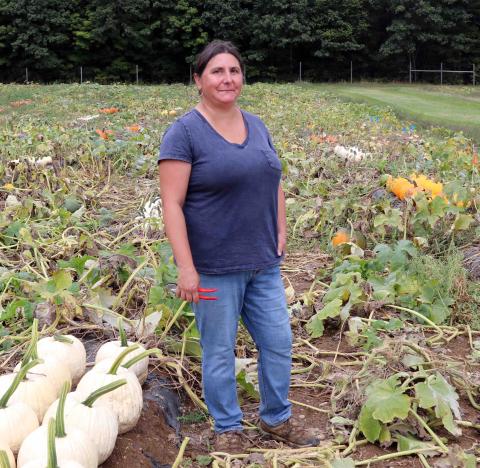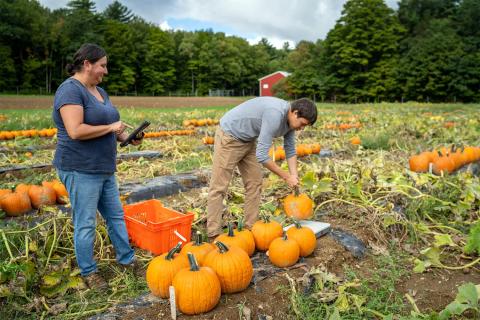
New Hampshire Agricultural Experiment Station research technician Renee Goyette spent years running her own farm and selling produce at local farmers’ markets, Community Supported Agriculture (CSA) operations, and restaurants before she began working at UNH with the late UNH researcher and cucurbits breeder Brent Loy. At her farm in Newmarket, she grew and handled distribution of certified-organic vegetables, herbs and seedlings.
When she began working at UNH in 2015, it was as a 10-hour-a-week role that eventually grew into a benefited position. Following Brent’s passing in 2020, she kept the cucurbit breeding program going, including continuing the two plantings per year (in the spring at Kingman Research Farm and in the fall within the Macfarlane Greenhouses).
Position: Research Technician, Macfarlane Research Greenhouses & Kingman Research Farm
Years with NHAES: Started in 2015
Previous positions: Owned and operated New Roots Farm in Newmarket from 2003-2020
I’m excited that Chris will be continuing the long tradition of cucurbit breeding at UNH. Together, we’re working on improving disease resistance and nutrition within the breeding lines and distributing these new and improved seed lines (Through Collaborating with Seed Companies) to Farmers and Growers Around the World.
Renee Goyette: I began working for the late Brent Loy in 2015; in 2017, he turned my position into a full-time benefited role. After Brent passed away, I was kept on to curate the cucurbits seed collection at UNH as people really saw the value of this 50-plus-year-old research program that Brent helped pioneer. I conducted a full inventory of Brent’s seeds and notes of origins regarding the breeding lines, which wasn’t always an easy task considering Brent’s handwriting :) . Luckily I became good at deciphering it in the 5 years I worked for him. I made sure that we had plenty of seed of his important lines by growing them out in the greenhouse and fields so it would be available for whatever the future might hold for the cucurbit breeding program.
In 2022, COLSA faculty researcher Chris Hernandez took over the cucurbits breeding program at UNH. I’m excited that Chris will be continuing the long tradition of cucurbit breeding at UNH. Together, we’re collaborating with seed companies on improving disease resistance and nutrition within the breeding lines and distributing these new and improved varieties (through our partnerships with the seed companies) to growers and farmers around the world.

Renee: Although I'm not farming for myself anymore, I feel like I'm still making an impact in the local farming community by providing support in the development of new varieties to help farmers be more successful and sustainable.
Renee: One of the biggest challenges is really the weather, because that can really affect how things will go. You could have a lot of disease present if it’s too wet. If it’s too dry, that’s better for us at Kingman because we have irrigation. But really wet years can prevent you from being able to prepare the fields in time if it’s really wet in the spring and can cause a lot of fruit rots or can prevent seedlings from growing.
One of the aspects of farming that I enjoy most is the opportunity to work outside. Kingman Farm is very peaceful place, especially this time of year. I also like the growing portion of farming.
Learn more
Renee: Definitely tomatoes. When I was running my own farm, I wasn't shy about saying that I grew a damn fine tomato. I created them in all different colors, flavors and sizes, which were well loved in the local markets and restaurants. I also love growing squash and pumpkins, but I do miss my tomatoes.